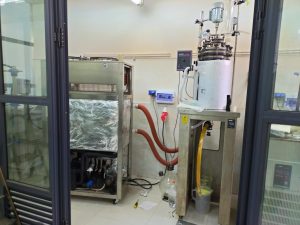What is the difference between glycol chillers and water-cooled chillers?
Both glycol chillers and chillers can be used to satisfactorily dissipate the heat generated during production. The fundamental difference between the two types of chillers is the variation in their freezing point and heat transfer capabilities.
Pure ethylene glycol or a mixture of ethylene glycol and water has a much lower freezing point than pure water. This means that glycol-based chillers are better suited for low-temperature environments. In contrast, water has a better ability to retain and conduct heat in the associated process than glycol mixtures. As a result, the heat transfer efficiency for water chillers will be higher than for glycol chillers.
Water: Using water as a coolant is an economical method as water is readily available at minimal cost in most cases. Alternatively, purified water (deionized water, reverse osmosis) can be used in water-based chillers for greater cooling efficiency.
Ethylene Glycol: Ethylene glycol-based coolants consist of either ethylene glycol or propylene glycol. Although the two variants have similar physical properties, they should never be mixed. The main benefits of glycol coolants are improved corrosion resistance and freeze protection.
Why use ethylene glycol for cooling?
Using a glycol-water mixture as a coolant has several advantages over using plain water as a coolant. These advantages are due to its unique physical properties, which include a lower freezing point than water.
Raccomandazioni correlate
-
How to Prolong the Service Life of Glycol Chiller System?
978In order to extend the service life of your glycol chiller in industrial applications, please pay attention to the following points: 1. Use automobile grade antifreeze carefullyDo not use automobile grade or unqualified antifreeze. Because this gl...
Visualizza i dettagli -
Refrigeration principle of LNEYA glycol chiller system
928Glycol Chiller System SUNDI -10℃ ~ 200℃, as we can tell from its name, it is to use Glycol as the refrigeration agent for the chiller.In the all air environment, because of the low temperature in the outdoors, it is impossible to use a cooling to...
Visualizza i dettagli -
-
Effetto della temperatura sulle reazioni della sintesi chimica organica
1278La sintesi organica è un fenomeno chimico comune in chimica. La temperatura ha un'influenza importante su di essa durante l'intero processo di sintesi. Con l'aumento della temperatura, la reazione che assorbe calore si accelera, determinando un cambiamento significativo...
Visualizza i dettagli
 Refrigeratori industriali LNEYA Produttore Fornitore
Refrigeratori industriali LNEYA Produttore Fornitore













